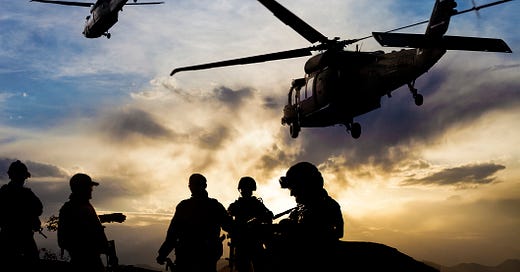Just 2,500 troops. That’s all we have had the past few years in Afghanistan. You would not know that from press coverage. The Biden Administration, with the announcement of its withdrawal, has now had to send in 3,000 troops to help evacuate people. In other words, to reduce to zero, we have increased by 3,000.
For what?
Paul Miller has a very solid read this morning. Much of what we tell ourselves about Afghanistan is based on a mythology that sprung up over hard years. It has been more than a year since an American soldier was killed in Afghanistan. Our presence held it together.
We gave up. And I am on the side that said we should withdraw in large part because our political and military leaders have been signaling our surrender in advance for several years. But there are a few things we need to keep in mind as so many of us consider the collapse of Afghanistan a failure.
For twenty years, we have kept the Taliban out. For twenty years, we have kept the Taliban from using Afghanistan to plot terrorist attacks on us or anyone else. For twenty years, our troop presence in Afghanistan has helped keep our homeland safe. For twenty years, the Taliban, Al Qaeda, and other terrorists had to be more worried about drones than the details of terror plots. For twenty years, there’s been no safe haven for them to go to plan large-scale attacks.
During those twenty years, the rate of literacy in Afghanistan has increased. The rate of education for girls has skyrocketed. The lifespan of the Afghani people has increased. Our presence did them good and us good.
But…
At some point, it seems we lost focus on the mission. We never eradicated the Taliban. Starting with Barack Obama, we kept saying we were going to pull our troops out. So the Taliban just waited us out and built up to take it back.
We signaled our future surrender starting with Obama. The Taliban took us at our word. And now they are sweeping back through the land and will have all of Afghanistan under their control probably by the twentieth anniversary of 9/11.
2500 American troops have held that country together without a casualty in over a year. Now, to accomplish his surrender, Joe Biden has sent in 3000 more to evacuate the remnant of American personnel as the Taliban sweep in.
On July 8, 2021, in answering questions about Afghanistan, Joe Biden said this:
Well, first of all, the mission hasn’t failed — yet. There is in Afghanistan, in all parties, there’s been corruption. The question is can there be an agreement on unity of purpose? What is the objective? For example, it started off, there were going to be negotiations between the Taliban and the Afghan National Security Forces and the Afghan government. That didn’t come to — didn’t come to fruition. So the question now is: where do they go from here? That — the jury is still out, but the likelihood there’s going to be the Taliban overrunning everything and owning the whole country is highly unlikely.
He was wrong.
The problem is not that we are leaving Afghanistan. Given our unwillingness to destroy the Taliban and our incompetence at nation-building, we probably should.
The problem is not that we are leaving, but the inevitability of our having to one day go back and do it all over again. The Taliban will not be tamed. They will only be killed or kill us.






Trump "negotiated" the surrender; Biden is incompetently carrying it out. Yes we should probably leave Afghanistan but let's not fool ourselves. There will be a bloodbath and a humanitarian nightmare that we are (at least indirectly) responsible for. The Taliban is a completely and totally insane pack of murderers. Once we get in to these hell holes it is very hard to get out.
With all wars, the goal is to win. I haven't seen that since WWII. And, never tell your enemy squat about your intentions! And this country always has gone back and built up the country to better than it was.